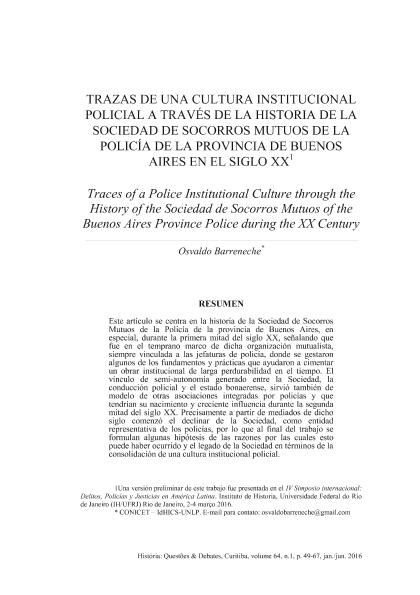Mostrar el registro sencillo del ítem
dc.contributor.author
Barreneche, Osvaldo

dc.date.available
2020-04-15T17:43:33Z
dc.date.issued
2016-07
dc.identifier.citation
Barreneche, Osvaldo; Trazas de una cultura institucional policial a través de la historia de la Sociedad de Socorros Mutuos de la Policía de la Provincia de Buenos Aires en el siglo XX; Assossiação Paranaense de História; História Questoes e Debates; 64; 1; 7-2016; 49-67
dc.identifier.issn
0100-6932
dc.identifier.uri
http://hdl.handle.net/11336/102649
dc.description.abstract
Este artículo se centra en la historia de la Sociedad de Socorros Mutuos de la Policía de la provincia de Buenos Aires, en especial, durante la primera mitad del siglo XX, señalando que fue en el temprano marco de dicha organización mutualista, siempre vinculada a las jefaturas de policía, donde se gestaron algunos de los fundamentos y prácticas que ayudaron a cimentar un obrar institucional de larga perdurabilidad en el tiempo. El vínculo de semi-autonomía generado entre la Sociedad, la conducción policial y el estado bonaerense, sirvió también de modelo de otras asociaciones integradas por policías y que tendrían su nacimiento y creciente influencia durante la segunda mitad del siglo XX. Precisamente a partir de mediados de dicho siglo comenzó el declinar de la Sociedad, como entidad representativa de los policías, por lo que al final del trabajo se formulan algunas hipótesis de las razones por las cuales esto puede haber ocurrido y el legado de la Sociedad en términos de la consolidación de una cultura institucional policial.
dc.description.abstract
This article deals with the history of the Mutual Aid, Friendly Society of the Buenos Aires Province Police, especially during the first half of the XX Century. The piece argues that it was in the early context of this mutual aid association, always tied to the mentioned Police Agency, where some ideas of how to conduct police business took place. The bond among the Society, the Police Agency, and the Provincial State Government served as influential model for other police associations which were born later on during the second part of the same Century. Precisely from the middle of the Century on the Society began to slowly fade away as a highly representative police association. However, the Society´s symbolic influence never disappeared and in this paper we would formulate some hypothesis about that endurance as well as its connections with the consolidation of a police institutional culture.
dc.format
application/pdf
dc.language.iso
spa
dc.publisher
Assossiação Paranaense de História
dc.rights
info:eu-repo/semantics/openAccess
dc.rights.uri
https://creativecommons.org/licenses/by-nc-sa/2.5/ar/
dc.subject
POLICIA
dc.subject
PROVINCIA DE BUENOS AIRES
dc.subject
SOCORROS MUTUOS
dc.subject
REVISTAS
dc.subject.classification
Otras Historia y Arqueología

dc.subject.classification
Historia y Arqueología

dc.subject.classification
HUMANIDADES

dc.title
Trazas de una cultura institucional policial a través de la historia de la Sociedad de Socorros Mutuos de la Policía de la Provincia de Buenos Aires en el siglo XX
dc.title
Traces of a Police Institutional Culture through the History of the Sociedad de Socorros Mutuos of the Buenos Aires Province Police during the XX Century
dc.type
info:eu-repo/semantics/article
dc.type
info:ar-repo/semantics/artículo
dc.type
info:eu-repo/semantics/publishedVersion
dc.date.updated
2020-03-25T13:54:38Z
dc.journal.volume
64
dc.journal.number
1
dc.journal.pagination
49-67
dc.journal.pais
Brasil

dc.description.fil
Fil: Barreneche, Osvaldo. Consejo Nacional de Investigaciones Científicas y Técnicas. Centro Científico Tecnológico Conicet - La Plata. Instituto de Investigaciones en Humanidades y Ciencias Sociales. Universidad Nacional de La Plata. Facultad de Humanidades y Ciencias de la Educación. Instituto de Investigaciones en Humanidades y Ciencias Sociales; Argentina
dc.journal.title
História Questoes e Debates

dc.relation.alternativeid
info:eu-repo/semantics/altIdentifier/url/https://revistas.ufpr.br/historia/article/view/47672
dc.relation.alternativeid
info:eu-repo/semantics/altIdentifier/doi/http://dx.doi.org/10.5380/his.v64i1.47672
Archivos asociados
